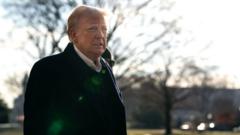The Trump administration made headlines late Friday after reportedly firing over a dozen federal inspectors general, an action that may face legal scrutiny for potentially violating federal law. During a Senate speech on Saturday, Senate Minority Leader Chuck Schumer condemned the dismissals as a "chilling purge," asserting that they reflect President Trump's fear of accountability and disdain for transparency.
Although the White House has yet to confirm these firings or respond to media inquiries, reports indicate that those affected were informed via email late Friday by the director of presidential personnel. The email cited "changing priorities" as the reason for their sudden termination, effective immediately. Among those dismissed were the inspector general for the Department of Health and Human Services and the inspector general for the Small Business Administration.
Multiple sources, including the New York Times, reported that a list of additional dismissed watchdogs circulated, with individuals from various federal departments—including Agriculture, Defense, and Education—also facing removal.
The role of inspectors general was established post-Watergate to promote government integrity and curb corruption. These watchdogs function autonomously within their respective agencies and are designed to operate impartially, although they are presidential appointees.
Legal experts warn that the firings could contravene a federal law mandating that the White House provide Congress with 30-day notice and specific justification for dismissing inspectors general. In an open letter, Hannibal Ware, the Small Business Administration's inspector general, argued that the dismissals lacked legal basis, urging the White House to reconsider.
Democrats were quick to denounce these actions, with Schumer characterizing them as indicative of a broader "lawless approach" by the Trump administration. Even some Republican senators expressed unease over the dismissals, with Senator Susan Collins questioning the rationale behind firing individuals tasked with investigating waste and corruption.
As the political fallout continues, many are left to ponder the implications of this unprecedented purge on governmental oversight and accountability moving forward.
Although the White House has yet to confirm these firings or respond to media inquiries, reports indicate that those affected were informed via email late Friday by the director of presidential personnel. The email cited "changing priorities" as the reason for their sudden termination, effective immediately. Among those dismissed were the inspector general for the Department of Health and Human Services and the inspector general for the Small Business Administration.
Multiple sources, including the New York Times, reported that a list of additional dismissed watchdogs circulated, with individuals from various federal departments—including Agriculture, Defense, and Education—also facing removal.
The role of inspectors general was established post-Watergate to promote government integrity and curb corruption. These watchdogs function autonomously within their respective agencies and are designed to operate impartially, although they are presidential appointees.
Legal experts warn that the firings could contravene a federal law mandating that the White House provide Congress with 30-day notice and specific justification for dismissing inspectors general. In an open letter, Hannibal Ware, the Small Business Administration's inspector general, argued that the dismissals lacked legal basis, urging the White House to reconsider.
Democrats were quick to denounce these actions, with Schumer characterizing them as indicative of a broader "lawless approach" by the Trump administration. Even some Republican senators expressed unease over the dismissals, with Senator Susan Collins questioning the rationale behind firing individuals tasked with investigating waste and corruption.
As the political fallout continues, many are left to ponder the implications of this unprecedented purge on governmental oversight and accountability moving forward.




















